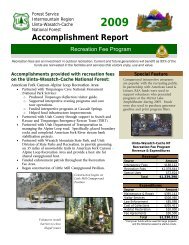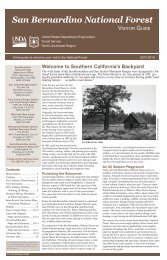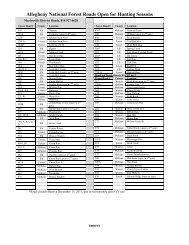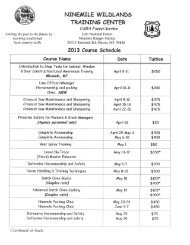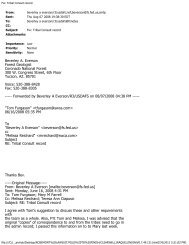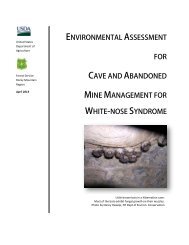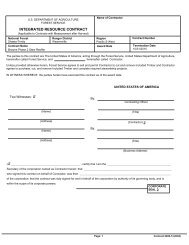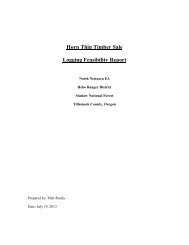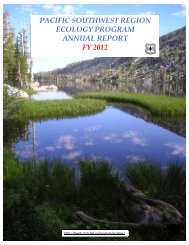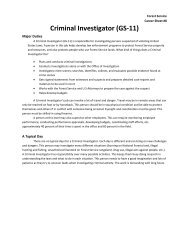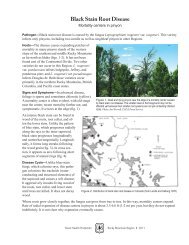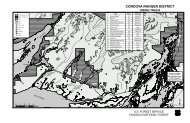Resource Name (Heading 1) - USDA Forest Service - US ...
Resource Name (Heading 1) - USDA Forest Service - US ...
Resource Name (Heading 1) - USDA Forest Service - US ...
Create successful ePaper yourself
Turn your PDF publications into a flip-book with our unique Google optimized e-Paper software.
Summary of Public Comments - Managing Recreation Uses in the<br />
Upper Segment of the Chattooga Wild and Scenic River Corridor EA<br />
a paddler, even if paddling were unlimited, as a reward for foregoing their intolerant status. While the EA<br />
struggles to define and escape the term “equitable,” it is inescapable that banning paddling to prevent<br />
conflicts that will never occur to benefit zero-tolerant anglers is not equitable. Considering limits only on<br />
paddlers when limits to anglers would do an equally good job of eliminating conflicts is not equitable. The<br />
conflict analysis violates at least the Appeal ROD, the WSRA, the FSM, and NEPA. It is clear that the EA<br />
confuses desires with conflicts: the presumption being that a small group of intolerant anglers desire a<br />
river without paddlers so therefore conflict will ensue if paddlers are allowed to float the river. Perhaps<br />
many Wilderness users secretly desire to have no one but themselves and their closest friends in a given<br />
Wilderness area, but that does not mean that conflict ensues when they meet another group. They likely<br />
smile, say hi, and continue their hike, paddle, or ride. Paddlers have a statutorily guaranteed place in<br />
Wilderness and on Wild and Scenic Rivers just like hikers and anglers, and in every single case share the<br />
resource. To equate base desires with conflict is just wrong and arbitrary. (Ltr# 168, Cmt# 27)<br />
Subconcern # H<br />
The “conflicts”, the only documented conflicts, are from the days of “Deliverance” when the locals hated<br />
all things that had to do with the Federal Government coming in and disturbing their God Given right to<br />
use and abuse whatever they wanted to.; i.e.. Like washing trucks in the river. Seems the Feds had as much<br />
trouble as any “new people”. Rangers were threatened as much as the fancy city slicker fly fishermen. The<br />
local raft companies had rafts slashed in the dark of night. Hikers, Fishermen, Boaters and Rangers all met<br />
equal distain from the locals. There has been no other documented conflict, just urban legend and a <strong>Forest</strong><br />
<strong>Service</strong> perpetuated perception of dislike between boaters and fishermen. (Ltr# 170, Cmt# 3)<br />
Subconcern # H<br />
#83- <strong>Forest</strong> <strong>Service</strong> has come to the conclusion that boaters are, and will always be, the soul instigator of<br />
conflict. Where is the proof? For decades, local boaters have regularly “poached runs” in the Upper<br />
Chattooga. Yet, the <strong>Forest</strong> <strong>Service</strong> has not reported a single case of conflict with any other user groups.<br />
For decades, boaters have run neighboring Overflow Creek, which is considered a prime fishing location.<br />
Yet, the <strong>Forest</strong> <strong>Service</strong> has not reported a single case of conflict with any other user groups. For decades<br />
boaters have shared the, heavily traveled, lower reaches of the Chattooga River with all user groups and<br />
even that does not have significant reports of conflicts. (Ltr# 193, Cmt# 76)<br />
Subconcern # H<br />
#86- The discussion of conflict on page 88 is without merit and should be deleted. Citing hearsay of conflict<br />
from another report does not make the report credible. No evidence is presented to show actual conflicts.<br />
In fact most of the actions described as conflicts are not over river use and solitude but describe criminal<br />
behavior by individuals. This is a situation easily remedied by law enforcement and arrest of unruly<br />
individuals. The argument that fishermen cannot behave around others so others should be banned from<br />
contact with fishermen is absurd. Boaters and fishermen have used Overflow and the West Fork without<br />
incident for over 30 years. The suggestion they cannot "play" together above 28 is without merit or<br />
evidence. (Ltr# 193, Cmt# 79)<br />
Subconcern # H<br />
#108- Paddling, fishing, and hiking have co-existed on Overflow Creek and the West Fork for many years<br />
without significant problems. The paddlers are on Overflow when the water is high, and the fishermen and<br />
hiker/waders are there when Overflow is low. The experience on Overflow, and for that matter on the<br />
Chauga, the Chattahoochee above Helen, the Jacks and the Conasauga, all show that water levels lead to<br />
self-management of use without significant conflict by paddlers, fishermen, and others. (Ltr# 193, Cmt#<br />
101)<br />
Subconcern # H<br />
#112- The Upper Chattooga is a public river that has never been open to boating. Limiting boating without<br />
extended user trials (opening it for a certain period of time during which scientific study is undertaken) or<br />
empirical evaluations of impacts (sociological/ecological) is both WRONG and UNJ<strong>US</strong>TIFIED. Without<br />
empirical analyses, there is no evidence that conflict between boaters and anglers would occur on the<br />
upper river. (Ltr# 193, Cmt# 105)<br />
Subconcern # H<br />
#255- First, the EA assumes that user conflicts will occur between boaters and other users if boaters are<br />
allowed on the upper river. However, the EA provides no hard evidence that this will happen. It discusses<br />
163



